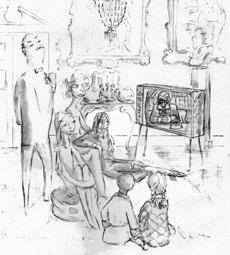
5 minute read
Poetry in motion
We should rejoice that non-Catholics recognise the cultural achievements of the Catholic Church, as Joseph Shaw explains
The big news of recent weeks has been the petition by 48 public figures, published in The Times, asking Pope Francis not to restrict the Traditional Mass. The names are impressive, and bear comparison with the great petition of 1971 which led to the English Indult. We can feel justly proud of the contribution Britain continues to make to the Traditional movement. (For the full text of the letter to The Times see page 13.)
Neither petition was an LMS initiative: they carried no baggage except their own text and the reputations of the signatories. On the new petition, Sir James MacMillan, a composer of international reputation and a Patron of the Latin Mass Society, quoted in our Press Release, notes the diversity of the signatories. They are both Catholic and non-Catholic, from the political left and right, journalists, politicians, arts administrators, a senior soldier, Princess Michael of Kent, and lots of singers, composers, and musicians.
We should rejoice that non-Catholics recognise the cultural achievements of the Catholic Church. As Pope Paul VI said in 1966, the Latin of the Office is ‘an abundant well-spring of Christian civilisation and a very rich treasuretrove of devotion.’ It is a treasure-trove of devotion as a well-spring of civilisation. It is well-spring of civilisation because it a treasure-trove of devotion.
We can’t be certain, but Pope Paul may well have written those words, in his Apostolic Letter Sacrificium laudis, in response to the first great petition, of 1966, organised by the founder of Una Voce Italia, Cristina Campo and signed, among many others, by Benjamin Britten, W.H. Auden, and Evelyn Waugh. That petition focused on Gregorian Chant, and Pope Paul’s Letter aimed to preserve it, at least in religious communities. He responded again in 1971 to a second international petition, in which British signatories were particularly well represented, with an Indult specific to England and Wales, a crucial concession that was later widened to include the whole world.

Will Pope Francis respond with similar grace? It is impossible to tell. Nevertheless, this petition is a very positive development, for several reasons.
Just as Pope Paul VI may not have known some of the British signatories in 1971, so Pope Francis may not have heard, for example, of the iconic clothes designer Paul Smith, the Spectator editor Fraser Nelson, or the former Labour front-bencher, and current Director of the V&A, Tristam Hunt. On the other hand, Cardinal Heenan, who delivered the 1971 petition to Pope Paul, would have been very aware of the significance of the signatories, and I’ve no doubt that our two current English cardinals, Vincent Nichols and Arthur Roche, will have a shrewd idea as well, or will be interested enough to check them out.
The names make a difference. First, they indicate that the issue is not just a matter of dealing with a tiny group of people within the Church: it is now also about the public perception of the Church, and of Pope Francis in particular, by all Catholics and by non-Catholics as well.
Second, it shows that the Traditional Mass continues to exert a gravitational pull on non-Catholics, as it did to St John Henry Newman, Oscar Wilde, and Mgr Benson. The awe of the pagan Russian ambassadors to Constantinople, at the Eastern liturgy - they famously wrote ‘we did not know if we were in heaven or on earth’ - was echoed by the ambassadors sent to the religious centre of the fictional world of Shakespeare’s A Winter’s Tale:
O, the sacrifice,
How ceremonious, solemn, and unearthly
It was i’ th’ off’ring!
Well, that continues to be the reaction, at least of the more sensitive visitor to the ancient liturgy. It is not an obscure, divisive rite that is best forgotten: it has evangelising power, over the most surprising people.
Third, it undermines many negative stereotypes applied to supporters of the Traditional Mass. The next time someone suggests that this Mass only appeals to ‘right wing’, ‘rigid’, ‘unimaginative’, male, and in general, low-status people, we can point out that that the fashion-designer Nina Cambell, the popular composer Lord Lloyd-Webber, and Bianca Jagger—not to mention George Galloway, who recently called the Traditional Mass ‘poetry in motion’ in a separate intervention—and many others of our cultural elite, have called for the Traditional Mass to be preserved: ‘to destroy it seems an unnecessary and insensitive act in a world where history can all too easily slip away forgotten.’
Whatever Pope Francis is pleased to do in the coming weeks, this petition strengthens the case for the Traditional Mass, and for overturning all the unpastoral restrictions on its celebration.
This issue’s cartoon reflects on an older stereotype of Catholics: an aristocratic Catholic family sits in their stately home watching a television programme suggesting that Catholics are illiterate, destitute Irish immigrants.










